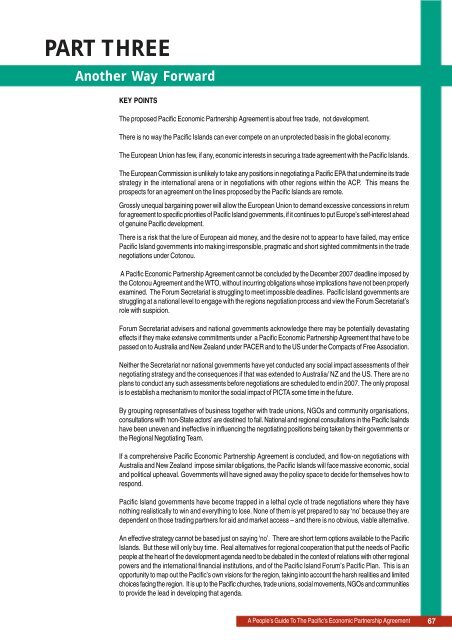REPA Booklet - Stop Epa
REPA Booklet - Stop Epa
REPA Booklet - Stop Epa
You also want an ePaper? Increase the reach of your titles
YUMPU automatically turns print PDFs into web optimized ePapers that Google loves.
PART THREE<br />
Another Way Forward<br />
KEY POINTS<br />
The proposed Pacific Economic Partnership Agreement is about free trade, not development.<br />
There is no way the Pacific Islands can ever compete on an unprotected basis in the global economy.<br />
The European Union has few, if any, economic interests in securing a trade agreement with the Pacific Islands.<br />
The European Commission is unlikely to take any positions in negotiating a Pacific EPA that undermine its trade<br />
strategy in the international arena or in negotiations with other regions within the ACP. This means the<br />
prospects for an agreement on the lines proposed by the Pacific Islands are remote.<br />
Grossly unequal bargaining power will allow the European Union to demand excessive concessions in return<br />
for agreement to specific priorities of Pacific Island governments, if it continues to put Europe’s self-interest ahead<br />
of genuine Pacific development.<br />
There is a risk that the lure of European aid money, and the desire not to appear to have failed, may entice<br />
Pacific Island governments into making irresponsible, pragmatic and short sighted commitments in the trade<br />
negotiations under Cotonou.<br />
A Pacific Economic Partnership Agreement cannot be concluded by the December 2007 deadline imposed by<br />
the Cotonou Agreement and the WTO, without incurring obligations whose implications have not been properly<br />
examined. The Forum Secretariat is struggling to meet impossible deadlines. Pacific Island governments are<br />
struggling at a national level to engage with the regions negotiation process and view the Forum Secretariat’s<br />
role with suspicion.<br />
Forum Secretariat advisers and national governments acknowledge there may be potentially devastating<br />
effects if they make extensive commitments under a Pacific Economic Partnership Agreement that have to be<br />
passed on to Australia and New Zealand under PACER and to the US under the Compacts of Free Association.<br />
Neither the Secretariat nor national governments have yet conducted any social impact assessments of their<br />
negotiating strategy and the consequences if that was extended to Australia/ NZ and the US. There are no<br />
plans to conduct any such assessments before negotiations are scheduled to end in 2007. The only proposal<br />
is to establish a mechanism to monitor the social impact of PICTA some time in the future.<br />
By grouping representatives of business together with trade unions, NGOs and community organisations,<br />
consultations with ‘non-State actors’ are destined to fail. National and regional consultations in the Pacific Isalnds<br />
have been uneven and ineffective in influencing the negotiating positions being taken by their governments or<br />
the Regional Negotiating Team.<br />
If a comprehensive Pacific Economic Partnership Agreement is concluded, and flow-on negotiations with<br />
Australia and New Zealand impose similar obligations, the Pacific Islands will face massive economic, social<br />
and political upheaval. Governments will have signed away the policy space to decide for themselves how to<br />
respond.<br />
Pacific Island governments have become trapped in a lethal cycle of trade negotiations where they have<br />
nothing realistically to win and everything to lose. None of them is yet prepared to say ‘no’ because they are<br />
dependent on those trading partners for aid and market access – and there is no obvious, viable alternative.<br />
An effective strategy cannot be based just on saying ‘no’. There are short term options available to the Pacific<br />
Islands. But these will only buy time. Real alternatives for regional cooperation that put the needs of Pacific<br />
people at the heart of the development agenda need to be debated in the context of relations with other regional<br />
powers and the international financial institutions, and of the Pacific Island Forum’s Pacific Plan. This is an<br />
opportunity to map out the Pacific’s own visions for the region, taking into account the harsh realities and limited<br />
choices facing the region. It is up to the Pacific churches, trade unions, social movements, NGOs and communities<br />
to provide the lead in developing that agenda.<br />
A People’s Guide To The Pacific’s Economic Partnership Agreement 67
















